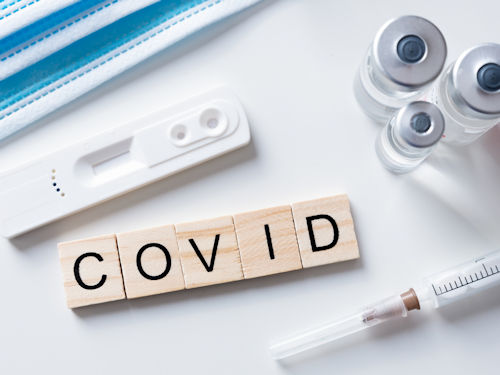The COVID-19 pandemic has brought about a whirlwind of change, uncertainty, and a series of questions about health and well-being in our community. As an Acupuncturist who spends a lot of time helping couples on their journey to conceive, one question I hear frequently is: “Does the COVID-19 vaccination affect fertility?” It’s an important question, and one that deserves a thoughtful, scientifically grounded response.
In my mind, in relation to the COVID-19 pandemic, I identify 2 factors that could cause a decline in fertility outcomes and neither of them are what you might be thinking. So, with that said, let’s dive in!
Pregnancy & COVID-19 Vaccination
The pandemic has raised questions and concerns about how the vaccine might affect those trying to conceive. But to alleviate these fears, numerous studies show that the COVID-19 vaccination does not negatively impact the process of getting pregnant!
On the contrary, getting vaccinated could be considered a step in preparing for a healthy pregnancy by protecting against the severe effects COVID-19 could potentially have on a pregnant woman and her unborn child.
There is No Evidence that COVID-19 Vaccines Affect Fertility
The fear that vaccines, especially the COVID-19 vaccines, could affect fertility has been debunked by several studies. Here are some key points:
- The COVID-19 vaccines authorised for emergency use have been subjected to rigorous testing in multiple stages of clinical trials, including trials that involved people of reproductive age. No negative effects on fertility were reported.
- The Australian Government Department of Health (DOH) and the Centres for Disease Control and Prevention (CDC) both state that COVID-19 vaccines do not impact fertility in men or women.
- There is no scientific reason to believe that vaccines could impact fertility, as they do not alter DNA or genetic material.

The Impact of COVID Vaccine on Menstrual Cycles
While some women have reported changes to their menstrual cycle post-vaccination, these changes are typically temporary and should not alarm those trying to conceive. It’s important to note that:
- Changes in menstrual cycles are not uncommon after any vaccination and are not at all limited to the COVID-19 vaccines.
- The menstrual cycle can be influenced by many factors, including stress, illness, and changes in routine, all of which have been common during the pandemic.
- Any changes in menstrual cycles post-vaccination are typically short-lived and return to normal within a few cycles. In contrast, significant studies have shown that 47% of women who have had the COVID-19 virus had a change in their menstrual cycle for at least 2 cycles after having the virus.
Research Studies of Fertility in Healthy Men
It’s not just women’s fertility health that’s in question when discussing the COVID-19 vaccination; men’s reproductive health is equally important. Studies have shown:
- There is no evidence suggesting a negative impact on sperm quality or quantity following vaccination.
- The vaccines do not affect testosterone levels, which play a crucial role in men’s fertility.
- Some preliminary studies actually indicate that men who had COVID-19 may experience decreased sperm quality especially for 60 days after the onset of the virus. Therefore, getting vaccinated could indirectly protect men’s fertility by reducing their risk of getting the virus or being affected to the same extent.
Managing Side Effects of Vaccination
As with any vaccine, the COVID-19 vaccine can have side effects. Most are mild, like pain at the injection site, fatigue, or mild fever, and go away on their own within a few days. However, if you are experiencing lingering or severe side effects, it is important to reach out to your General Practitioner for advice.
How has the COVID-19 Pandemic Impacted Fertility Health?
1. The COVID-19 Virus Itself
The first way in which COVID-19 has impacted fertility is the virus itself in unvaccinated people. Inflammation from the virus has a significant impact on both males and females-whether that be suppressing sperm production or disrupting the regularity of menstrual cycles as already mentioned. Given that more than 2 doses of the vaccine have been shown in studies to have 90% efficacy against the COVID-19 virus, not being vaccinated presents a real risk for decreased fertility.
2. Stress and Anxiety
The global COVID-19 pandemic has not only threatened our physical health but has had profound effects on mental health and overall well-being in our community. The myriad of changes, from the lockdowns, and remote work, to the constant worry about the health of those we care about have been a common and significant source of stress and anxiety. This increased stress, which could be considered a pandemic within a pandemic, has potential implications for fertility.
The fertility rate in Australia, like many developed nations, has been trending downwards for several reasons, including women choosing to have children later in life and economic factors. The stress of the pandemic is another layer of complexity that needs to be addressed in this context. As we grapple with the pandemic’s aftermath, it is more important than ever to pay attention to stress management and its implications for fertility health.
The Stress-Fertility Connection
Stress can significantly impact fertility in both men and women. The human body responds to stress by releasing cortisol, a hormone that, in excess, can disrupt the delicate balance of hormones necessary for reproduction. Stress can interfere with ovulation in women and sperm production in men, making conception more difficult.
Moreover, stress can also indirectly affect fertility by influencing behaviour. High levels of stress often lead to poor sleep, unhealthy eating habits, decreased physical activity and decreased libido – all of which can negatively impact fertility.
How Can We Better Manage Stress?
With the strain of the COVID-19 pandemic, finding ways to better manage stress during these times has become more important than ever.

Healthy Lifestyle Habits
Establishing healthy lifestyle habits is one of the most effective ways to reduce stress levels. These can include:
- Exercise: Regular physical activity has been shown to reduce stress levels and improve mood. Whether it’s a short walk, a yoga class, or a more intense workout, any form of exercise can help.
- Healthy Diet: Eating a balanced diet rich in fruits, vegetables, lean proteins, and whole grains can help your body better cope with stress. Avoid excessive caffeine and alcohol, which can exacerbate anxiety and stress.
- Adequate Sleep: Sleep is crucial for your physical and mental health. Aim for seven to nine hours per night and try to keep a consistent sleep schedule, even on weekends.
Mind-Body Techniques
Practices that foster a deep mind-body connection can also help manage stress. Some examples are:
- Meditation: Regular practice of mindfulness or other forms of meditation can help lower stress levels and promote a sense of calm. There are many apps on mobile phones that can be used to help guide you on this.
- Breathing Techniques: Simple deep breathing exercises like box breathing can stimulate the body’s relaxation response, reducing stress.
Support Networks
Never underestimate the power of social connection:
- Stay Connected: Maintain regular contact with friends and family, even if it’s via phone or video calls. Social connections can provide emotional support and a sense of belonging which helps us all maintain sanity and put our day-to-day life in perspective.
- Seek Professional Help: If stress and anxiety become overwhelming, consider seeking help from a healthcare professional- we are always here to help.
Natural Therapies for Stress Management & Fertility Optimisation
While these stress management techniques are effective if you apply them, and consistently, it’s also worth considering natural therapies such as Acupuncture.
Once seen as an alternative form of medicine, Acupuncture is now recognised for its ability to treat a variety of health issues, including stress, and anxiety and naturally enhancing fertility outcomes.
- Stress Reduction: By stimulating the nervous system, Acupuncture can activate the body’s ‘rest and digest’ mode, reducing stress levels.
- Hormone Balance: Acupuncture can also help regulate the hormones in our body, many of which are thrown off balance by chronic stress.
- Inflammation Control: Chronic stress can lead to chronic inflammation, which Acupuncture can help manage.
Acupuncture is Not a Cure-All
Whether you are trying to conceive or are concerned about your overall health following vaccination, Acupuncture is a science-based approach to optimise your health. It is not a cure-all, but rather, a method to support and promote your body’s inherent healing capabilities. It’s about creating an internal environment conducive to health and fertility.

In Summary
As we navigate through these uncertain times, it’s essential to base our decisions on factual, science-based information. It’s clear that COVID-19 vaccinations do not negatively impact fertility in men or women. If anything, they serve to protect our overall health which is a crucial factor when trying to conceive.
There are 2 primary contributing factors to decreased fertility amidst the COVID-19 pandemic, neither of them are the vaccine, instead, they are the impact of contracting COVID-19 unvaccinated and the heightened levels of stress and anxiety that relate to not understanding COVID-19, the vaccine or otherwise just excessively worrying about those we care about. Remember, every individual is unique. Stay healthy, stay informed, and remember, we’re in this together.
If you have been trying to conceive or otherwise are still concerned about the COVID-19 vaccine, the virus itself or otherwise have observed that stress has been a developing issue for you, reach out to us via (02) 4709 6727, or book a consultation now online. We would be happy to discuss what is going on in your situation and how we can help.







